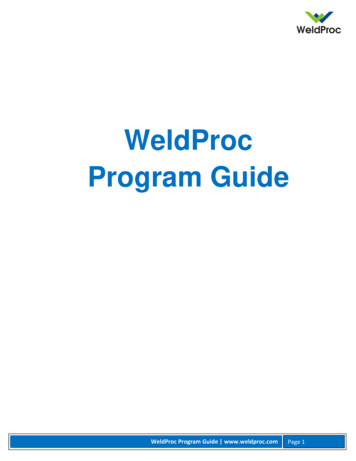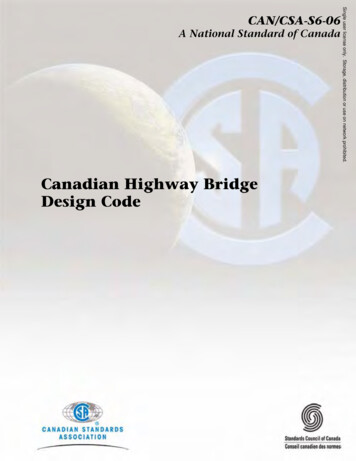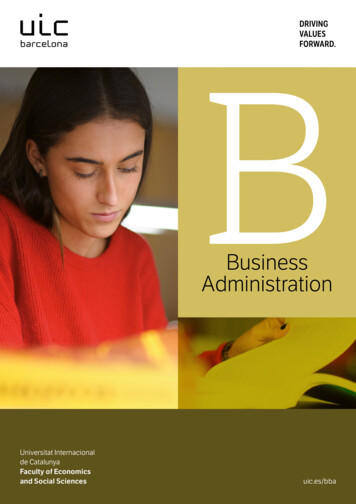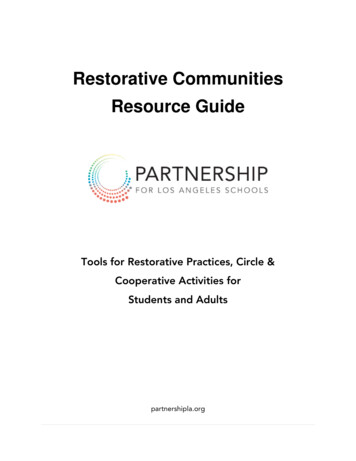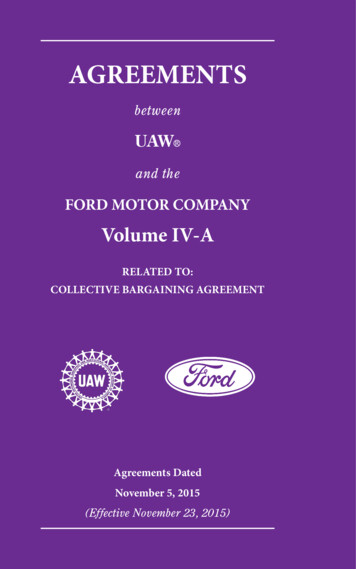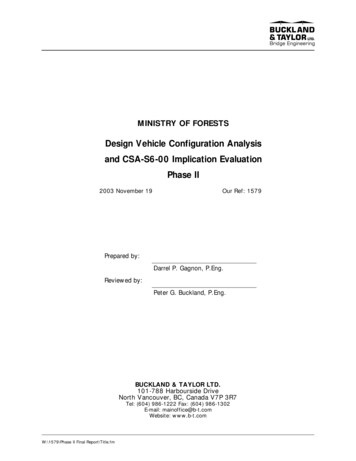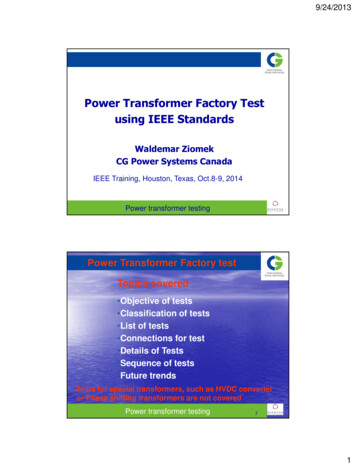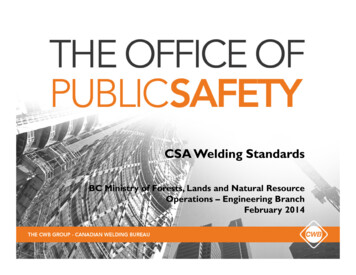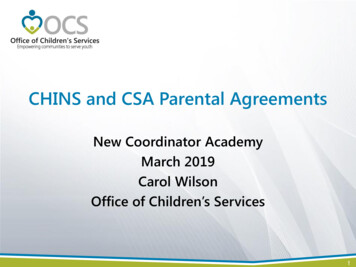
Transcription
CHINS and CSA Parental AgreementsNew Coordinator AcademyMarch 2019Carol WilsonOffice of Children’s Services1
Why do we have CSA Parental Agreements? CSA Parental Agreements were created as a way to solve aproblem. Problem: How do we help parents of children with severeemotional/behavioral problems access residential treatmentwithout requiring parents to go to court, work with the LDSS,or even relinquish custody? Children with emotional/behavioral needs were consideredeither not eligible for CSA or non-mandated.2
Problem Parents might be told that the only way CSA could fundresidential treatment was for the parent to relinquish legalcustody, have the court determine the child to be in need ofservices and placed in foster care. This would put the child inthe “mandated” CSA population. An alternative was the non-custodial agreement whichpermitted parents to retain legal custody3
Problem But Non custodials were problematic because– Filing a petition and court involvement including reviewwere still required– For all practical purposes, and from a federal standpoint,the child was in foster care– Statutory language “permitted” non-custodials, whichlocalities interpreted to mean they did not have to offerthis option4
Problem Issue of custody relinquishment came to theattention of the General Assembly Posed question to the Attorney General regardingwhether or not CSA should be responsible forproviding mental health services to children5
Answer Opinion rendered in December 2006 which stronglystated that no parent in the Commonwealth ofVirginia should ever have to relinquish custody toobtain mental health treatment for a f6
Practice Issues How could the requirements of the AG’s opinion beput into practice? Interagency Guidelines were developed based on theAG’s opinion under the direction of the StateExecutive Council, the policy and oversight body forCSA.7
Problem Solved The Interagency Guidelines for the Provision of Foster CareServices to Specific Children in Need of Services including the:– CHINS Eligibility Checklist; and the– CSA Parental Agreementcreated the mechanism to solve the problem.8
Why CHINS? Why was a determination of CHINS so important? How did the CHINS determination help resolve thecustody relinquishment issue?9
CHINS Created a Path to CSA Eligibility10
Foster Care Services– The Code of Virginia does not have a definition of “fostercare”, rather defines “foster care services.”– Code defines “foster care services” as “the provision of afull range of casework, treatment and communityservices ” (§63.2-905)11
CSA Eligibility – Foster Care ServicesCOV §63.2-905“Foster care services are the provision of a full range of casework, treatment and communityservices, including but not limited to independent living services, for a planned period of time toa child who is abused or neglected as defined in § 63.2-100 or in need of services as defined in §16.1-228 and his family when the child (i) has been identified as needing services to prevent oreliminate the need for foster care placement, (ii) has been placed through an agreementbetween the local board or the public agency designated by the community policy andmanagement team and the parents or guardians where legal custody remains with the parentsor guardians, (iii) has been committed or entrusted to a local board or licensed child placingagency, or (iv) is living with a relative participating in the Kinship Guardianship Assistanceprogram set forth in § 63.2-1305 and developed consistent with 42 U.S.C. § 673. Foster careservices also include the provision and restoration of independent living services to a personwho is over the age of 18 years but who has not yet reached the age of 21 years, in accordancewith § 63.2-905.1.” (italics added effective July 1, 2018).12
Four Types of Foster Care ServicesFoster Care Prevention (communitybased)Placement through an agreementbetween a parent/guardian where theparent retains custody and the localboard or a public agency designatedby the CPMT (Non-Custodial or CSAParental Agreement)FOSTER CARESERVICESCommitment, Entrustment orCustody to the Local DSSKinship Guardianship13
Two CategoriesAbuse/Neglect Eligible for “foster careservices” includingprevention of foster careplacement No need to use CHINSchecklist to determineeligibility No standard checklist todetermine eligibility forthis populationChild in Need of Services Eligible for “foster careservices”, includingprevention of foster careplacement Court determines or FAPTuses CHINS Checklist todetermine eligibility asCHINS14
“Foster Care Services” CSA Children who are eligible for “foster care services” areeligible for CSA. (§2.2-5212) Children who are eligible for “foster care services” asdefined in §63.2-905 are “mandated” for CSA,meaning “sum-sufficient” funding for services mustbe appropriated by state and local governments.(§2.2-5211)15
Only CHINS– The “Interagency Guidelines” do not affect the provision ofservices to children who are receiving foster care servicesbecause of abuse or neglect. The CHINS Eligibility Checklist is not used for these children. These children are receiving foster care services, includingprevention and placement, because of abuse and/or neglect, notbecause of their mental health needs.16
Guidelines Guidelines Documents (found in Resource Library onwww.csa.virginia.gov)– Interagency Guidelines for the Provision of Foster CareServices to Specific Children in Need of Services– CHINS Eligibility Checklist– CSA Parental Agreement– VDSS Non-Custodial Agreement (On FUSION)17
CHINS Checklist Provides an alternative to Court determination of CHINS If court determines child to be CHINS, criterion #1 is met. FAPT may determine that a child is “in need of services”using the Eligibility Checklist for documentation. All four criteria must be met (“does”- “is”).18
CHINS Checklist Checklist is completed by FAPT; child meets all fourcriteria. Child is eligible for either:– Services in the community (prevention of foster care) CSA Parental Agreement is NOT needed.OR– Services outside of the home in a treatment setting suchas residential, group home, or treatment foster care CSA Parental Agreement is needed.19
Age 14 Provision? The definition of a “child in need of services” reads “(i) a child whose behavior, conduct or condition presents or results in aserious threat to the well-being and physical safety of the child or (ii) a childunder the age of 14 whose behavior, conduct or condition presents or resultsin a serious threat to the well-being and physical safety of another person; ”COV §16.1-228 (emphasis added)Why is there a stipulation about the age of the youth if thethreat is to another person? What does that mean?20
Age 14 Provision What about a sixteen year old who physically assaultsand threatens to continue to assault his grandparentswith whom he lives? Could he meet the CHINS criteria? YES21
Case Management Who will case-manage a child in need of services? Agencies at FAPT/CPMT are:–––––Department of Social ServicesLocal school divisionCourt Services UnitCommunity Services BoardLocal CSA officeCase management decision is based on child’s best interests22
Two options The Code of Virginia defines foster care services toinclude two options for placement when a parentretains legal custody:COV §63.2-905 (ii) has been placed through an agreement between the local board or the publicagency designated by the community policy and management team and the parents or guardianswhere legal custody remains with the parents or guardians (emphasis added)– DSS Non-Custodial Foster Care Agreement– CSA Parental Agreement23
What about LDSS? LDSS may not case manage CSA ParentalAgreements. Comparable agreement is the non-custodial. LDSS case manages, child placed outside of home isconsidered in foster care. Federal laws and benefitsapply. Child does not have to be in legal custody of LDSS tobe “in” foster care.24
DifferencesDSS Non-CustodialCSA Parental Agreement DSS is case manager Child is in foster careplacement-all federal andstate foster carerequirements must be met Court involvementrequired Eligibility for federalbenefits (Medicaid, IV-E,etc.) must be determined Agency other than LDSS iscase manager Child is receiving a “fostercare service” and is not infoster care placement Court involvement is notrequired Child is not eligible for IV-E.May be eligible for Medicaidbased on parents’ income.25
CSA Parental Agreement CSA Parental Agreement is a contract between theparents/guardians and the agency designated by theCPMT. The CPMT has fiscal responsibility. Terms include the rights and responsibilities of theparent/guardian, what is expected of the agency,financial terms and length of agreement26
CSA Parental Agreement Parties must agree that out of home placement is:– In the child’s best interests,– Most appropriate and least restrictive setting to meetchild’s needs; and– Mutually agreed upon by the FAPT and the parents/legalguardians.CSA Parental Agreements are voluntary agreements.27
CSA Parental Agreements Only used for short-term out of home placementsfor treatment purposes May not be used for other types of placements suchas respite Placements may be in:– Residential facilities (PRTFs)– Group homes– Treatment Foster Care (use cautiously)28
CSA Parental Agreement CSA Parental Agreement– Parent retains legal custody.– Voluntary agreement! Focus is on treatment of child, notparent’s ability to care for or provide a safe home for child.– Parent/guardian is actively involved in all phases ofassessment, decision-making, service delivery and review.– Goal is always to return home.– Parent places child, not agency. Parent may remove at anytime, per the terms of the individual agreement.– Residence of parent/guardian matters.– Determine fiscal responsibility of all parties.29
CSA Parental Agreement Parent changes residence to another locality-whathappens? Parent moves out of state-what happens?30
Length of Stay Length of Stay– Short- term! Set target date. If child is still in need oftreatment on that date, review plan.– Placement may not last indefinitely.– CSA requires utilization review.31
Inappropriate Use CSA Parental Agreements are not appropriate if child andfamily are receiving services because of abuse and/orneglect.––––VoluntaryParent retains legal custodyNo court involvementMay not be used as an alternative to foster care placementwhen abuse/neglect is present CSA Parental Agreements are not a substitute for fostercare placement.– Focus is treatment, not protection or permanency– Child does not have same federal and state protections as achild in foster care32
Role of the Court CSA Parental Agreements were created to provide analternative to court involvement for parents who sought aplacement for mental health treatment for a child. There is no statutory requirement for a “child in need ofservices” as determined by the FAPT to be involved with thecourt. CSA Parental Agreements do not include or address the roleof the court.33
Role of the Court But, a court may:– Determine a child to be CHINS– Exercise the dispositional alternative of ordering aplacement agreement between LDSS or agencydesignated by the CPMT where the parent retains legalcustody.– Order a non-custodial foster care agreement.Use of the voluntary CSA Parental Agreement is notconsistent with court-order of treatment.34
Court Involvement Because it was not developed for this purpose, theCSA Parental Agreement template may not be agood fit for situations where the court orders aplacement through an agreement between anagency designated by the CPMT and the parent,where the parent retains legal custody.35
Problems Problems arise when CSA Parental Agreements arenot used appropriately:Court is involvedChild is in need of permanencyNo target date set for terminationNo agreement on what constitutes successful completionof treatment– Used for child not in intended population (i.e.,behavioral/emotional needs)– Parent moves to another locality or state––––36
37
CSA Parental Agreements are not appropriate if child and family are receiving services because of abuse and/or neglect. –Voluntary –Parent retains legal custody –No court involvement –May not be used as an alternative to foster care placement when abuse/neglect is present CSA Parental
